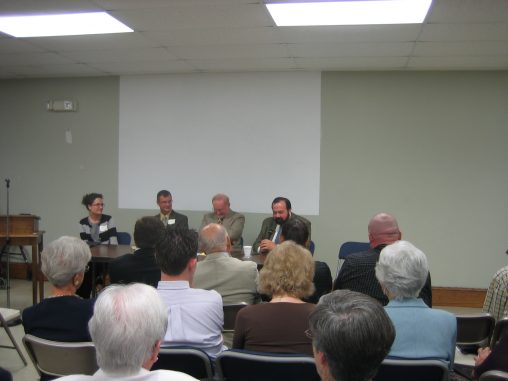If you’re involved in community improvement efforts in Richmond, it probably means you go to lots of meetings.
Planning meetings, board meetings, government meetings, brainstorming meetings, project update meetings, budget meetings…yes, of course. And then there are the annual dinners, kickoff events, awards ceremonies, networking meals, celebrations and many other kinds of gatherings; it seems some weeks don’t go by without four or five of these happening.
There are several hundred not-for-profit organizations operating in Richmond alone, not to mention all of our government agencies, community-minded business groups and others. Most of them have meetings like these somewhere along the way.
These meetings aren’t the only places that good ideas about the future of our city are shared, but they’re some of the main ones. Unfortunately, most of the time, those good ideas stay locked away in the minds or personal notes of the people who attended, unavailable to the rest of the people of Richmond.
I think we need to change that.
 Every time someone gives a speech or presentation about what they are doing (or what they see other people doing) to make Richmond a better place, ideas are shared.
Every time someone gives a speech or presentation about what they are doing (or what they see other people doing) to make Richmond a better place, ideas are shared.
Every time a local not-for-profit organization discusses a revised budget or proposed program changes for its year ahead, it confronts important truths about community needs, opportunities and resources.
Every time a board meeting is called to order, a group of people sit around the table ostensibly doing some of their best thinking about how to do good, efficient work that benefits the area.
And then there are all the materials assembled to help prepare for, conduct and follow up on these gatherings. Agendas, minutes, budgets, slide decks, planning documents, evaluations, year-in-review/year-ahead reflections, notes about new possibilities to explore. Pages and pages that reflect huge amounts of time, energy and hard work put in to making Richmond a better place.
Sometimes these meetings are covered or recorded by local media, most often they are not. And so when the meetings adjourn and the related emails and paperwork get filed away, unless some specific effort is made to share that information more widely, most people will have no access to the conversations, ideas and thinking that happened there. It might be something small – a spark of an idea, a compelling statistic – or it could be a game-changing piece of comprehensive research. (A number of years ago a very expensive consultant delivered a very thorough assessment of Richmond’s economic realities to a local economic development group, and it never saw the light of day.)
My suggestion is simple: whenever possible, people and organizations doing community improvement work in Richmond should publish their ideas, conversations and materials for others to find.
Maybe some parts of these materials are sensitive or truly confidential, and it’s understandable that those parts would be left out. But I would say that even “works in progress” and other relatively unpolished records still deserve to be shared whenever possible. If we wait for everything to be arranged just so for a glossy annual report, we introduce long delays between the time an idea or conversation emerges and the time others can build on it.
Most local organizations have public websites where this information could easily go at no additional cost to them. If they don’t, they can use any of the myriad free publishing tools out there to start a very simple, nothing fancy web presence where they can share documents, transcripts, audio/video and more with the click of a button. In a world of pervasive smart phone use, even the most casual users of technology are empowered to share information quickly and easily – do it on Twitter if you have to. Some training may be helpful for less tech-savvy orgs to get started, and we have great local resources to help with that.
It’s important to say that having information available “upon request” is probably not sufficient here. Asking someone to stop by your office, set up a meeting, pick up the phone may seem like a minor and time-saving barrier to set up. But we live in an age where information’s availability online is synonymous with it existing at all. If we can’t find it in a Google search, it’s not really there. (This also points to the importance of providing transcripts of any audio/visual resources you produce.)
Publishing everything may seem like a lot of effort for little benefit. Who’s going to bother reading through old meeting minutes and presentations, anyway?
Maybe no one.
But I’ve written before about the challenges of duplication, repetition and overlap in local community building work. (At one point I even tried to create a public repository of good ideas for improving Richmond, so we could benefit from more shared thinking about them over time.) It’s too easy to get lost in the echo chamber of the same faces showing up at the same kinds of gatherings year after year, and it’s too easy to assume that if someone wants to get involved, they’ll just automatically know who to contact or where to start. And I think the potential for inefficiency, lost time and duplicated efforts is still very real; how many different food pantry programs do we have operating independently from each other in Richmond? Too many. How many local businesses are actively talking about the challenges of finding and developing an appropriately skilled workforce? Most all of them. And so on.
When we publish the proceedings of our community improvement thinking and work, we at least provide an opportunity for some other person or organization to join the conversation and build on what we’ve done. Maybe a similar conversation is happening across town, or maybe it will happen again a decade later in a completely different setting. Maybe there’s an entrepreneurial student at a local high school who has a great idea to solve the same community challenge. Maybe there’s someone with financial resources looking for a project to fund. Maybe someone halfway across the world is running a web search looking for just your kind of idea to partner on.
When we keep our ideas locked away in private meetings and email folders, we take away these opportunities. We miss a chance to save time and money, almost inviting duplication and overlap. We slow down innovation and entrepreneurship. I don’t think Richmond can afford those particular inefficiencies any longer.
If you’re involved in local community building, if you find yourself going to the kinds of meetings I mentioned and especially if you’re involved in facilitating them, please consider amplifying your efforts by publishing information about the good work that’s happening, as it’s happening. It’s a small but important way to make sure Richmond has every opportunity to succeed.
Photo by Josh Harper

Leave a Reply